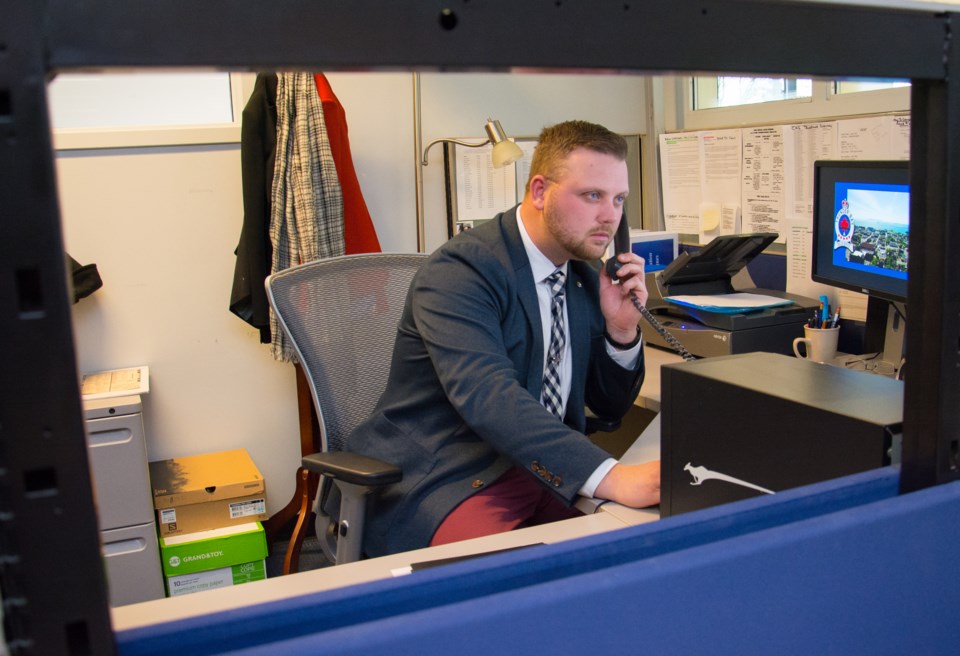THUNDER BAY — Every year, city police respond to thousands of calls of intimate partner violence.
In 2013, the Thunder Bay Police Service created a five-member domestic violence unit, which has since been expanded to include a sixth officer and has been rebranded as the intimate partner violence unit.
Over the past five years, Thunder Bay police have reported around 3,400 intimate partner violence calls annually, peaking in 2020 with more than 3,500 incidents.
Within the last several weeks, police have turned to social media to report high weekend call volumes. On the weekend of July 14, the police service responded to 304 calls for service, which included 14 relating to intimate partner violence. This past weekend, the police service had 498 calls for service, with 19 of those involving intimate partner violence.
Det.-Insp. Jeremy Pearson, who oversees investigative services, said violence between partners is a long-standing problem in the city.
"It's fair to say that consistently — and for an extended period of time. I would argue, decades," he says.
On Tuesday, a coalition of local anti-violence groups called on the city to declare intimate partner violence as an epidemic. A news release said Thunder Bay has one of the highest rates of intimate partner violence and sexual assault of any municipality in the country, above both the provincial and national averages.
A deputation is expected to be made to Thunder Bay city council in September.
"During and since the COVID pandemic, Thunder Bay and District social and justice service providers who respond to different aspects of gender-based violence have become extremely concerned about the high rates of [gender-based violence] in Thunder Bay and alarmed about the lack of effective systemic response to keep women and children safe from their abusers," a statement reads.
"Service providers here are seeing men who are serial abusers continuing their use of violence from one family to another."
Thunder Bay Police Service Det. Sandra Beaulieu, who leads the intimate partner violence and break, enter and armed robbery units, noted that Thunder Bay's population includes many people that are transient to the area.
Those people often face a lack of support, along with a lack of resources and places to stay, she added.
"In addition, there is a significant problem with the drug and gang culture in the city of Thunder Bay, which obviously has a rolling effect into other areas that causes additional problems," she says.
Training for officers is vast and wide throughout the service. When an intimate partner violence call comes through to the police, primary response officers are the first to attend. They are trained in a "trauma-informed approach, as understanding the approach of the victims to be victim-centred," Beaulieu says.
She says there are instances when partner agencies, like Faye Peterson House or Elizabeth Fry Society, will reach out directly to the unit.
Pearson added that it could take several instances of violence before someone calls the police for the first time.
"[There's] a robust program of education and support to encourage survivors to come forward and to interact with police," Pearson says.
When dealing with family violence, shelter and hotel availability comes at a premium, Beaulieu stated that sometimes officers will need to bring victims back to the police station while appropriate accommodations are made. She added there are also occasions where her officers will need to call the supporting agencies directly asking for accommodation assistance.
While the topic of intimate violence isn't new, the stigma around being a victim can be complex and distressing. Beaulieu said there are positive outcomes for many who have stepped forward and reported abusive situations.
She noted a recent case where a woman was able to get away from a negative domestic situation, her children have been relocated for their safety, and the victim is securing visitation.
"[She] has gone on to secure employment, which wouldn't have been possible without the community supports," Beaulieu says. "She's at a place where she can get back up on her feet."
These successes are also applicable to historical cases where victims have been through a traumatic event but have had the strength to acknowledge their success in moving forward.
"It reminds you of the reason we all came into this work in the first place," Beaulieu says.
"We want to help people and kind of guide them on a path because you can see so much strength and desire within a lot of these women, and sometimes men [that] are victims as well, and just to be able to see them come back and have that communication and be able to share their story."
Pearson noted the importance of recognizing the issue.
"The fact that we as a service and as a community recognize intimate partner violence is a serious issue. It's something that we have, we have taken seriously for the duration of my career. And I think that there is, there is still often a question, on the part of survivors, if will they be believed? How will they be treated?" he says.
"If there's any assurance I can offer, not only will the police service take these calls very seriously. A report to the police triggers a cascading response."
If you or someone you know is in need of assistance regarding intimate partner violence, there are many agencies in Thunder Bay that can help. Beendigan can provide temporary shelter for Indigenous women and their children. As well, Faye Peterson House is a shelter for survivors/ women and children who have left or leaving abusive situations.
